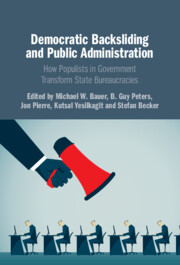 Democratic Backsliding and Public Administration
Democratic Backsliding and Public Administration Book contents
- Democratic Backsliding and Public Administration
- Democratic Backsliding and Public Administration
- Copyright page
- Contents
- Figures
- Tables
- Contributors
- Preface
- 1 Introduction: Populists, Democratic Backsliding, and Public Administration
- 2 Incomplete Democratization, System Transformation, and the Civil Service: A Case Study on the Weimar Republic and the Nazi Regime in Germany
- 3 Resilience Without Resistance: Public Administration Under Mutating Populisms in Office in Italy
- 4 Illiberal Transformation of Government Bureaucracy in a Fragile Democracy: The Case of Hungary
- 5 Public Administration in Poland in the Times of Populist Drift
- 6 Technocratic-Populist Mayors and Public Administration in Three European Cities
- 7 Populism and the Deep State: The Attack on Public Service Under Trump
- 8 “Doublespeak Populism” and Public Administration: The Case of Mexico
- 9 Venezuela: Sidelining Public Administration Under a Revolutionary-Populist Regime
- 10 Working, Shirking, and Sabotage in Times of Democratic Backsliding: An Experimental Study in Brazil
- 11 Public Administration: How to Respond to Populism and Democratic Backsliding
- 12 Conclusions: Public Administration Under the Rule of Democratic Backsliders
- References
- Index
8 - “Doublespeak Populism” and Public Administration: The Case of Mexico
Published online by Cambridge University Press: 17 August 2021
- Democratic Backsliding and Public Administration
- Democratic Backsliding and Public Administration
- Copyright page
- Contents
- Figures
- Tables
- Contributors
- Preface
- 1 Introduction: Populists, Democratic Backsliding, and Public Administration
- 2 Incomplete Democratization, System Transformation, and the Civil Service: A Case Study on the Weimar Republic and the Nazi Regime in Germany
- 3 Resilience Without Resistance: Public Administration Under Mutating Populisms in Office in Italy
- 4 Illiberal Transformation of Government Bureaucracy in a Fragile Democracy: The Case of Hungary
- 5 Public Administration in Poland in the Times of Populist Drift
- 6 Technocratic-Populist Mayors and Public Administration in Three European Cities
- 7 Populism and the Deep State: The Attack on Public Service Under Trump
- 8 “Doublespeak Populism” and Public Administration: The Case of Mexico
- 9 Venezuela: Sidelining Public Administration Under a Revolutionary-Populist Regime
- 10 Working, Shirking, and Sabotage in Times of Democratic Backsliding: An Experimental Study in Brazil
- 11 Public Administration: How to Respond to Populism and Democratic Backsliding
- 12 Conclusions: Public Administration Under the Rule of Democratic Backsliders
- References
- Index
Summary
This chapter discusses how the Mexican public administration is being affected by a backsliding process triggered by the current government of Andrés Manuel López Obrador. It argues that Mexico is experiencing a case of what could labelled “doublespeak populism,” which is transforming in profound ways the country’s public administration. López Obrador’s agenda has been embedded in terms and phrases traditionally associated with the political left, but his policy measures actually reflect topics closer to the right. Moreover, these measures have been introduced whilst deliberately concealing their ultimate intentions and potential effects.As a result, López Obrador’s reforms have further deteriorated bureaucratic institutions and public services, thus affecting the overall welfare and basic rights of the people they are supposed to help. The chapter draws on policy proposals, presidential speeches, analyses from academics and policy experts, and news reports to assess the broader administrative consequences of López Obrador’s doublespeak populism on Mexico’s democratic governance.
Keywords
- Type
- Chapter
- Information
- Democratic Backsliding and Public AdministrationHow Populists in Government Transform State Bureaucracies, pp. 178 - 199Publisher: Cambridge University PressPrint publication year: 2021
- 13
- Cited by
